How Thatcher kept Israel’s political leaders smiling
Newly-released archives give an insight into the UK's views about Israel during the premiership of Britain's first female Prime Minister
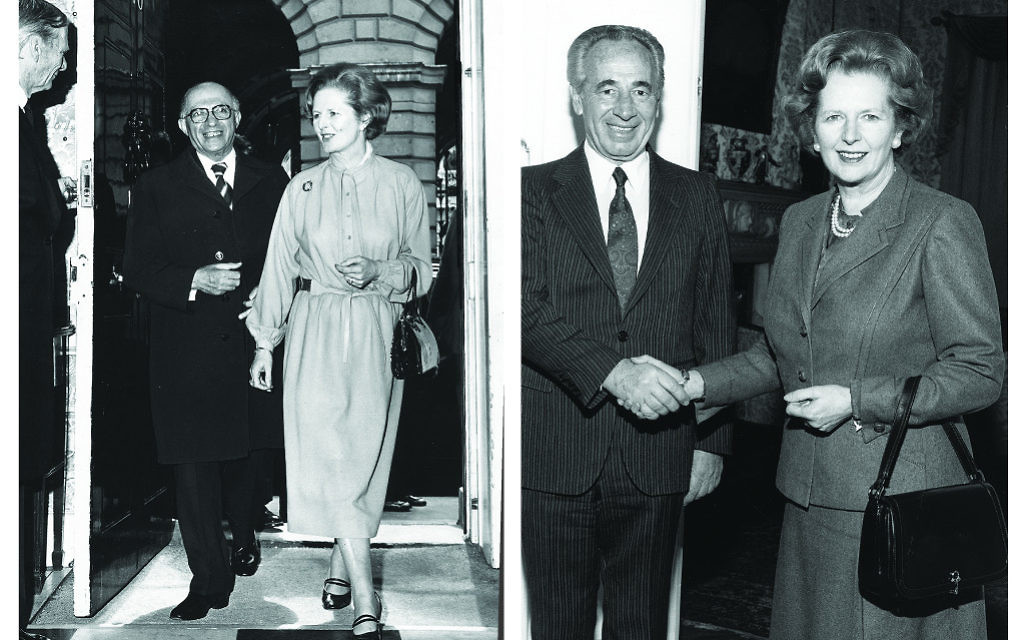
Newly-released papers have offered an insight into Britain’s views of the Middle East in the decade spanning 1979 to 1989 – and a behind-the-scenes look at Margaret Thatcher’s relationship with four Israeli leaders.
Much of the material in bulky files hitherto kept secret by the Prime Minister’s office, and now released by the National Archives in Kew, relates to preparations for London meetings with the Israelis, with copious briefing notes provided by civil servants and the then British ambassador to Israel.
In May 1979, Begin wrote to Thatcher to congratulate her on her election victory and to tell her that the Jewish community in the UK had invited him to London to celebrate the signing of the peace treaty with Egypt. Could he come and see her while he was in London?
Get The Jewish News Daily Edition by email and never miss our top stories Free Sign Up
An introductory civil service memo sets the scene. “We understand that Mr Begin’s staff hope he may be offered a lunch or some other official entertainment. If the Prime Minister wished to show him this mark of hospitality it would clearly be very much appreciated; but Lord Carrington [the then Foreign Secretary], does not think it strictly necessary.”
In the next memo, we read: “One way of handling the call, which might spare you Mr Begin’s usual 30-minute lecture on the Middle East situation, would be to invite him to a small working lunch…” Scribbled in the margin, Thatcher writes, “agree small lunch”. A date is arranged of 23 May and, on 17 May 1979, John Mason, the British ambassador to Tel Aviv, sends through a candid briefing note.
“When Mr Begin calls on the Prime Minister he will be both anxious to create a good impression and confident of doing so. He will also wish to discover whether the new government is, in the classic phrase, ‘good for the Jews’….
“Beneath a confident exterior I believe Mr Begin to be in a mood of much uncertainty. This is not, as it should be, that he is worried that Israel’s forecast inflation rate for the year is now 90 percent. That does not interest him. It is rather that the signature of the peace treaty with Egypt represents in his own mind the highest practicable peak of his life’s achievement.
“By making peace with Egypt, as no other contemporary Israeli could have done, Mr Begin believes that he has shown himself to be the equal of Ben-Gurion in the history of the state so far. He is, indeed, at present trying to rewrite history to show that it was his organisation, the Irgun, and not, as was the case, Ben-Gurion’s Haganah, which played the leading part in achieving Israel’s independence.
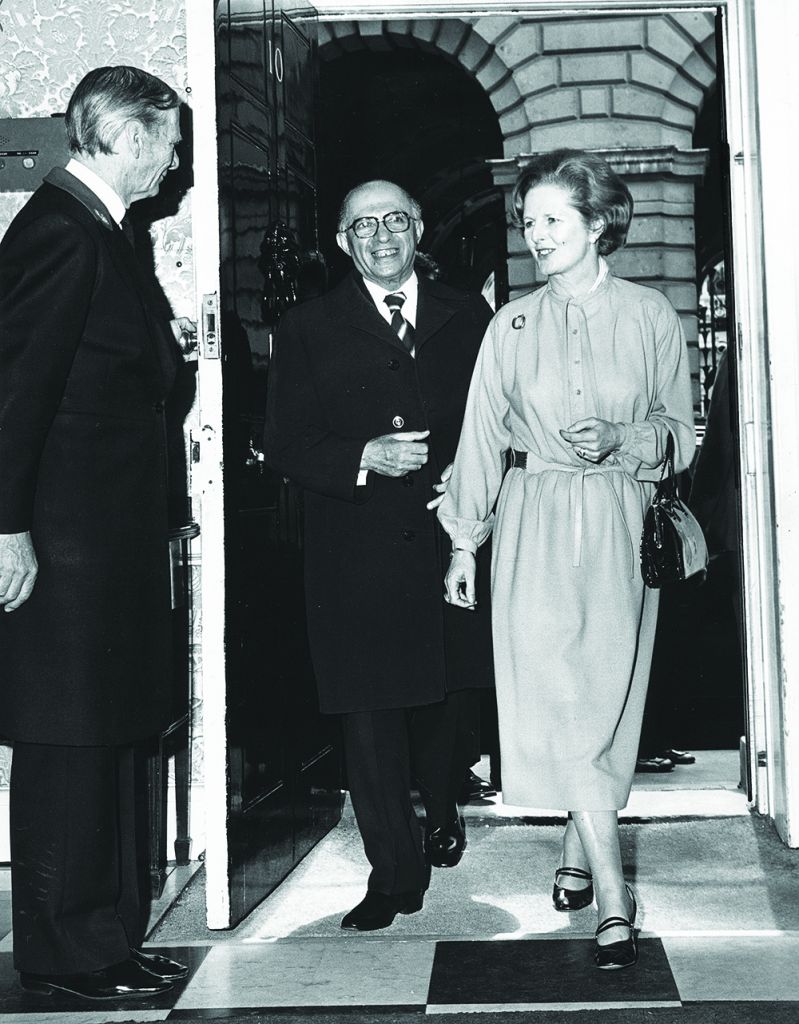
“As I have said, Mr Begin will be on his best behaviour in London, and anxious to make the best of impressions. If he cannot resist moments of either dogmatism or gallantry, I hope that it will be charitably understood that both are deeply rooted in his nature.”
Biographies for both Begin and his wife, Aliza, are provided for Thatcher before the lunch. Aliza is described as “as nice a woman as one could meet, [who] looks after him as a hen looks after its chicks. She is said to be at least as hard-line as he, and with increasing influence over him”.
On the discussion menu are trade, whether UK will sell North Sea oil to Israel, the Arab boycott, EEC enlargement, and the situation of Jews in Iran and Syria. Israel had asked Britain to intercede on behalf of the then 5,000 members of the Syrian Jewish community and allow them to emigrate.
The briefing note says: “The Syrian government would probably be glad to rid itself of the problem but is constrained by its own efforts to dissuade the Soviet government from allowing the emigration of Soviet Jews to Israel.”
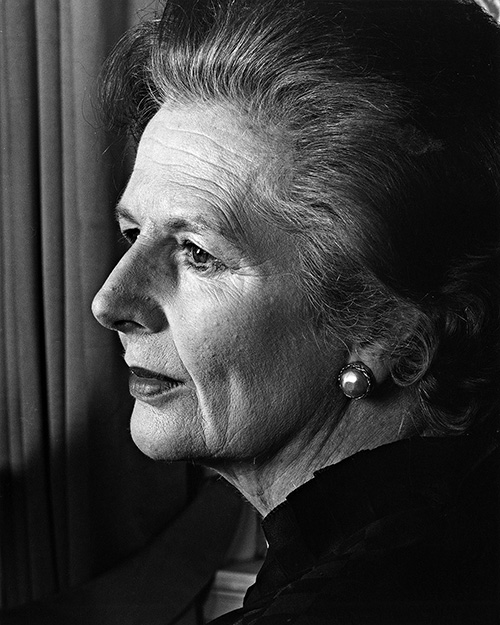
Though the lunch was conducted in a “warm and friendly atmosphere”, Begin could not resist making it clear that Israel would never agree to a Palestinian state. His reason was not just about Israel’s own security, but because he believed that such a state “would simply become a Soviet base, since the PLO were Soviet agents. A situation would be created in which there were Soviet generals on the West Bank — a Soviet base in the heart of the Middle East.”
Those summing up the lunch added: “Mr Begin recalled the sufferings of the Jewish people both during and after the Second World War, from which nobody had acted to save them. It was against this background that Israel’s views on security should be judged.”
Lord Carrington was unimpressed, and “commented that one man’s security could be another man’s threat”.
After the encounter, Thatcher was pessimistic. She felt that “it was clear from the discussion that Mr Begin had no comprehension of the broader aspects of security and that there was no basis on which he could be persuaded to change his narrow concept of it. She was apprehensive that Mr Begin’s attitude could kill the whole process of the search for a comprehensive settlement in the Middle East”.
In July 1985, Downing Street started planning for a prime ministerial visit the following January by Shimon Peres. Israel was said to be “especially pleased” that Prince Charles had agreed to hold a lunch for Peres.
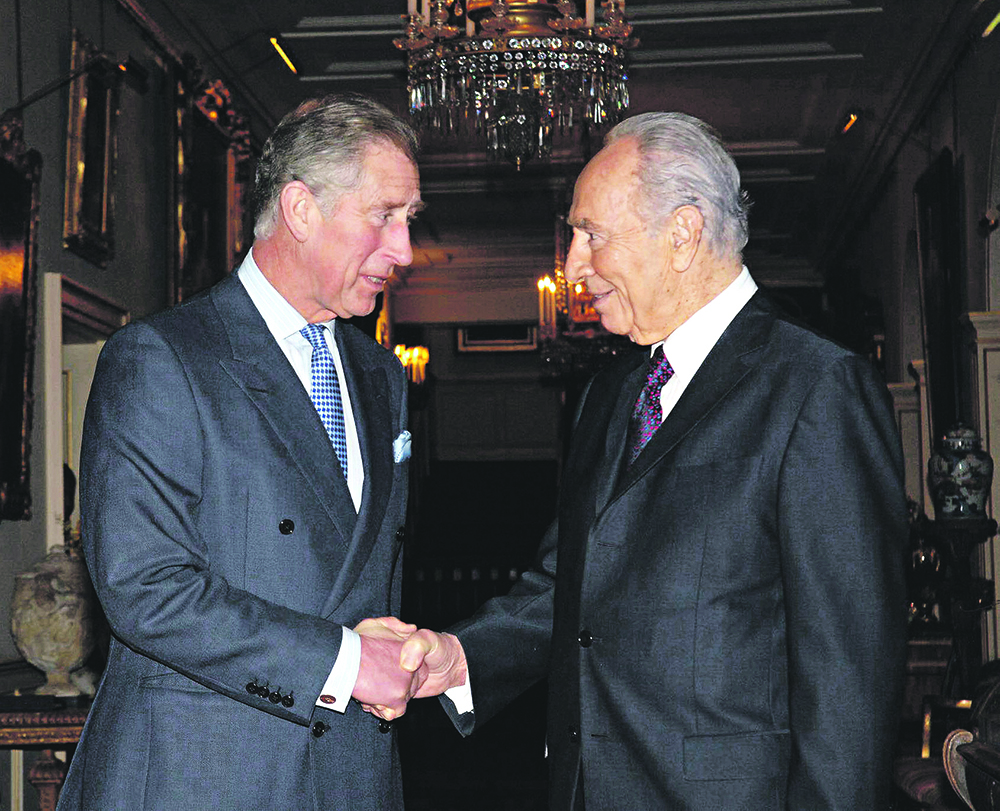
In November 1985, Peres, as usual full of plans, proposed the setting up of a “bi-national foundation for research and development in industry” between the countries. But he was told straight away that there was no public money for such a scheme, though private investment might be possible — a far cry from the several joint ventures which exist between the governments today.
In an assessment of Peres before the visit, the Tel Aviv embassy advised Thatcher: “His quiet voice and low-key manner mask a strong-nerved political operator… he has kept his balance and his cool and enhanced his national reputation. He is a poker player, not a paratrooper.”
Israel, the civil servants tell Thatcher, are anxious about football: specifically, whether Israel can play in European football competitions and if Britain is blocking it.
In a further briefing note to Thatcher before Peres’ arrival, her aide Charles Powell tells her to offer the Israeli PM good news and bad news. “If Mr Peres raises the Arab boycott you can give him some good news and say that we are ready to discontinue FCO authentication of signatures on Arab boycott documents.” If, however, Peres were to propose “research co-operation, we have no public funds for this at present, and prefer to leave it to the private sector”.
In the event, Thatcher and Peres got on famously and it was a most successful visit.
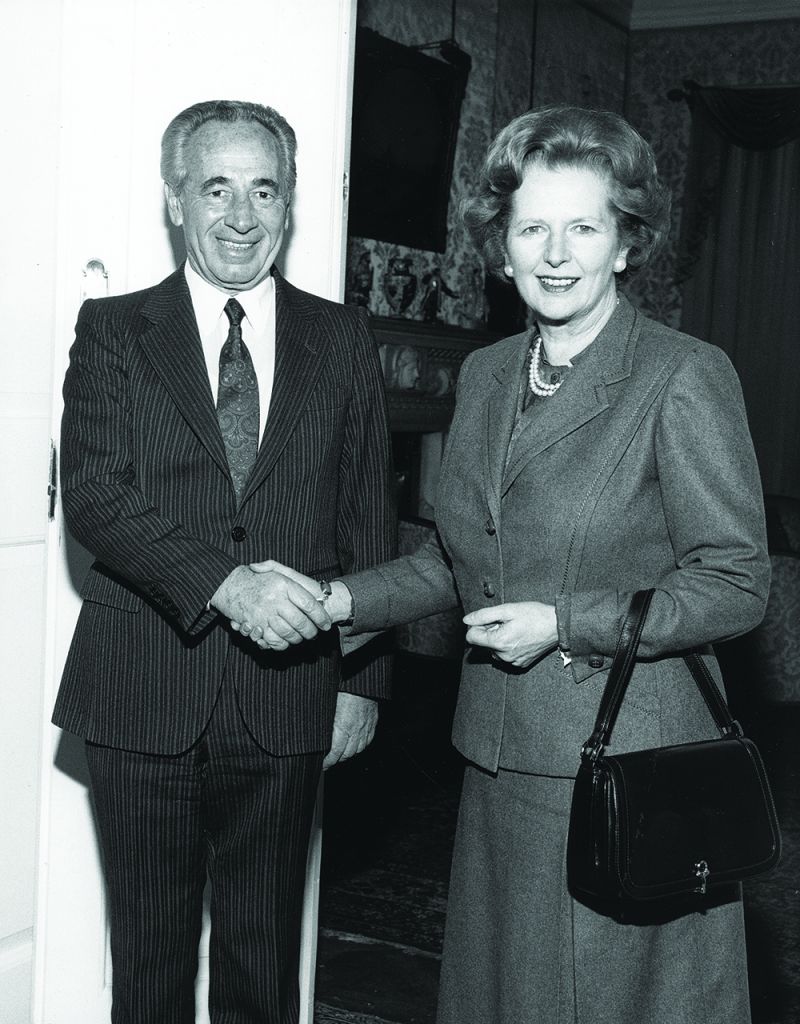
Three years later, however, Britain was notified that “Shamir is quite likely to propose that he visit the UK in May 1989”.
Thatcher said she would give Shamir a working lunch for up to 65 guests. In a pre-visit assessment, the British embassy in Tel Aviv warned Downing Street that Shamir was “a difficult man and very sensitive. His poor English makes it virtually impossible to have the sort of relationship you used to enjoy with Mr Peres. But he is very anxious that he should be treated — and be seen to be treated — exactly in the way that Peres was.”
In the event, an unconfident Shamir read out a speech at the lunch which lasted, to the guests’ evident horror, a full 52 minutes. It did not go down well.
Prior to the Shamir visit, Benjamin Netanyahu sought a meeting with Powell in Downing Street. A long briefing note was written by the Foreign Office to Powell.
It said: “Netanyahu is a rising Likud hawk. He earned a good reputation as Israel’s permanent representative in New York 1983-1988 and is apparently going on to the US, no doubt to rally the US/Jewish community and to prepare the way for an early visit by Shamir.”
Downing Street, advised the Foreign Office, could “reassure Netanyahu that we have no wish to see Israel isolated; she should therefore regain the initiative and test the PLO’s sincerity by accepting face-to-face negotiations within the framework of an international conference on the basis of Security Council resolutions
242 and 338.
“You might also ask Netanyahu how he expects the situation in the Occupied Territories to develop. In this context you could express regret at recent deportations (13 on 1 January), which are contrary to the Fourth Geneva Convention and unhappy examples of action likely to increase bitterness and resentment among the Palestinians”.
After the visit, Powell wrote back with his assessment of Netanyahu. He wrote: “He lives up to his billing. He is a formidable operator with strong and hawkish views.”
A few days later, Powell wrote another briefing note to Thatcher, this time giving details of a meeting held by Foreign Office minister William Waldegrave with the PLO leader Yasser Arafat Powell wrote: “There is too much of an impression of fawning over Arafat; there is too much talk of a British initiative. There is no such initiative and making claims for one could expose us to a sharp snub and risk making us look ridiculous.”

Thank you for helping to make Jewish News the leading source of news and opinion for the UK Jewish community. Today we're asking for your invaluable help to continue putting our community first in everything we do.
For as little as £5 a month you can help sustain the vital work we do in celebrating and standing up for Jewish life in Britain.
Jewish News holds our community together and keeps us connected. Like a synagogue, it’s where people turn to feel part of something bigger. It also proudly shows the rest of Britain the vibrancy and rich culture of modern Jewish life.
You can make a quick and easy one-off or monthly contribution of £5, £10, £20 or any other sum you’re comfortable with.
100% of your donation will help us continue celebrating our community, in all its dynamic diversity...
Engaging
Being a community platform means so much more than producing a newspaper and website. One of our proudest roles is media partnering with our invaluable charities to amplify the outstanding work they do to help us all.
Celebrating
There’s no shortage of oys in the world but Jewish News takes every opportunity to celebrate the joys too, through projects like Night of Heroes, 40 Under 40 and other compelling countdowns that make the community kvell with pride.
Pioneering
In the first collaboration between media outlets from different faiths, Jewish News worked with British Muslim TV and Church Times to produce a list of young activists leading the way on interfaith understanding.
Campaigning
Royal Mail issued a stamp honouring Holocaust hero Sir Nicholas Winton after a Jewish News campaign attracted more than 100,000 backers. Jewish Newsalso produces special editions of the paper highlighting pressing issues including mental health and Holocaust remembrance.
Easy access
In an age when news is readily accessible, Jewish News provides high-quality content free online and offline, removing any financial barriers to connecting people.
Voice of our community to wider society
The Jewish News team regularly appears on TV, radio and on the pages of the national press to comment on stories about the Jewish community. Easy access to the paper on the streets of London also means Jewish News provides an invaluable window into the community for the country at large.
We hope you agree all this is worth preserving.
-
By Laurent Vaughan - Senior Associate (Bishop & Sewell Solicitors)
-
By Laurent Vaughan - Senior Associate (Bishop & Sewell Solicitors)
-
By Laurent Vaughan - Senior Associate (Bishop & Sewell Solicitors)
-
By Laurent Vaughan - Senior Associate (Bishop & Sewell Solicitors)





















